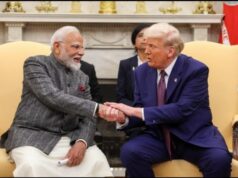NEW DELHI: The Trump administration announcing U.S. troop cut in Afghanistan to 2,500 by January 15, 2021 was “expected” and ” Afghan security forces have been preparing, carrying out more than 95 per cent of all counter-terrorism and counter-narcotics operations, since 2014,” says M. Ashraf Haidari, Afghanistan’s Ambassador to Sri Lanka. President-elect Joe Biden and his advisors know the Af-Pak “region well” and are “committed to staying the course with a strong, residual force to fight against the Taliban, Al Qaeda and ISIS,” he told StratNews Global Associate Editor Amitabh P. Revi, adding the new administration knows “peace efforts can’t succeed” unless “safe sanctuaries and safe havens that support and sponsor them are closed down.” The envoy, who was also deputy ambassador in India and America, pointed out that key officials like Michèle Flournoy, who is reportedly in line for the Secretary of Defense post, “stand for a responsible, conditions-based withdrawal.” Despite President Trump’s withdrawal decision, there is bipartisan U.S. support too, he said, pointing to reactions from key Republicans like Lindsey Graham and Senate Majority leader Mitch McConnell.
Why is the U.S. not holding the Taliban to its written declarations? How will the Biden presidency deal with the region? Is the Republic’s negotiating team divided in the face of a unified Taliban stance, and what can Afghanistan learn from Sri Lanka winning the war against the LTTE? Listen in.
The 'Eye' of the story not the 'I' of the story. That's Amitabh Pashupati Revi's credo from the beginning of his professional journey in 1995. From conflicts in the war zones of Afghanistan, Syria, and Iraq to nuances of international politics in the Maldives,Thailand, and South Sudan, Amitabh has reported from all the world's continents, except for Antarctica(so far). Though, he has documented the world's third pole, the Siachen Glacier!
Amitabh reports and produces documentaries on the two-front China-Pakistan threat to India. His ground reports from Arunachal Pradesh and Ladakh have received viewership in the hundreds of thousands. Amitabh has interviewed world leaders, top global analysts, and experts in India, Russia, the United States, and Australia as well. Along the way, he’s picked up the Russian language, the Ramnath Goenka Award for his reporting on the 'Islamic State' terrorist group in Iraq, the Khaled Alkhateb Award for his reporting from Palmyra, Syria, and the UN Dag Hammarskjöld Distinguished Journalist Fellowship. Last but not least, as a founder member of StratNews Global, Amitabh helps lead the reporting, editorial, production, and administration teams at StratNews Global, BharatShakti, and InterStellar on their journey ahead.




